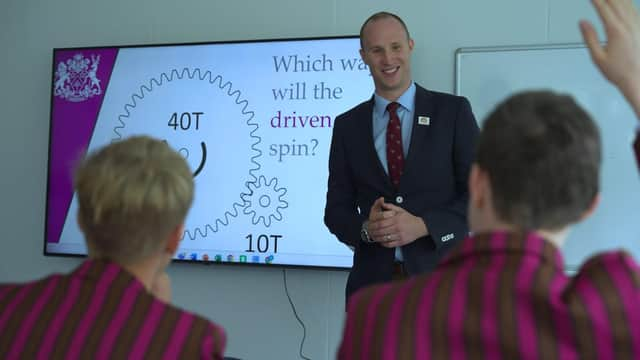Michael Alton: Education sector must embrace positive failure if we’re to build a curriculum for the future


Latin – tick. Greek – tick. Vehicle engineering – a big tick, too. That last subject might not be one that springs to mind when considering the curriculum of Fettes College But real-world education has seen a major shift which places practical application and experience-based learning at the forefront of preparing the next generation for working life.
We saw how important problem-solving was during the Covid-19 pandemic. There was a great willingness to embrace change and innovate in the face of a national health emergency. Spirits companies switched to producing hand sanitisers, fashion houses began manufacturing medical face masks, and Isle of Man residents pooled their resources together to 3D print visors for health workers. Practical skills were used to solve real-life problems.
Advertisement
Hide AdAdvertisement
Hide AdThis innovation is all around us in the current climate – just last month, a Canadian museum showcased a range of futuristic footwear designs, including digitally designed and 3D printed shoes.
Inspired by the need for practical and transferable skills that can be applied to the real world, all Third Form (13+) students at Fettes are now gearing up to work on their own engineering project, in which they will be tasked with designing and manufacturing a small vehicle using the workshop equipment and resources. The project, which aims to develop students’ mindset of iterative design, will allow them to work through the task at hand in their own way: researching, developing and modelling their ideas as they go.
Adding Engineering, Enterprise and Technology (EET) into the curriculum at Fettes was a distinctive opportunity which the school had to seize. It provides our students with the opportunity to problem solve through perseverance and curiosity, while also allowing them to foster these skills through the practical application of knowledge.
It also allows us to move away from the traditional approach to learning, focused on memorisation and standardised testing, which is no longer sufficient on its own to prepare individuals for the complexities of modern life, and doesn’t contribute to building a curriculum for the future.
While more traditional subjects will always have their place in the curriculum, an education that bridges the gap between the classroom and the real world, and one where learning isn’t confined to textbooks, is essential.
The demand for these hands on, practical and digital skills in the job market and wider world is clear. It’s the reason why universities are now ringfencing time within their own curriculums to teach practical skills that can be applied outside of the classroom. So, why shouldn’t schools do the same?
The EET model of learning blends traditional practices of manufacturing, using software and technology to enhance that experience. It means students can flourish through hands-on experience and practical wisdom.
As they enter the Senior School at Fettes, all students are now receiving an education in the development of EET, featuring lessons in robotics, structural engineering, programming and 3D printing. From September next year, students will also have the option to take EET as an alternative to one of their GCSE options and will qualify for a Higher Project Qualification (HPQ) in its place.
Advertisement
Hide AdAdvertisement
Hide AdWith this change will come challenges, as with any divergence from a traditional education programme. We must embrace that change.
This new kind of learning provides more opportunities for richer problem-solving experiences both in and out of the classroom.
And so, equally as important as embracing change on this journey is to not only recognise failure, but to celebrate it. Missteps and setbacks are not defeats but stepping stones toward success. It's in these moments of challenge and adversity that we learn the most, refining our strategies and gain the wisdom to overcome future obstacles.
Ultimately, if we are to achieve the curriculum for the future that we all want to see, we must be alive to the need for systemic change and be bold in embracing it. Positive failure is not an option, but a reality. That’s the real world – if you’re not failing, you’re not doing it properly.
Michael Alton is the Founding Head of Engineering, Enterprise and Technology at Fettes College. He took up the post in August 2023.
Comments
Want to join the conversation? Please or to comment on this article.